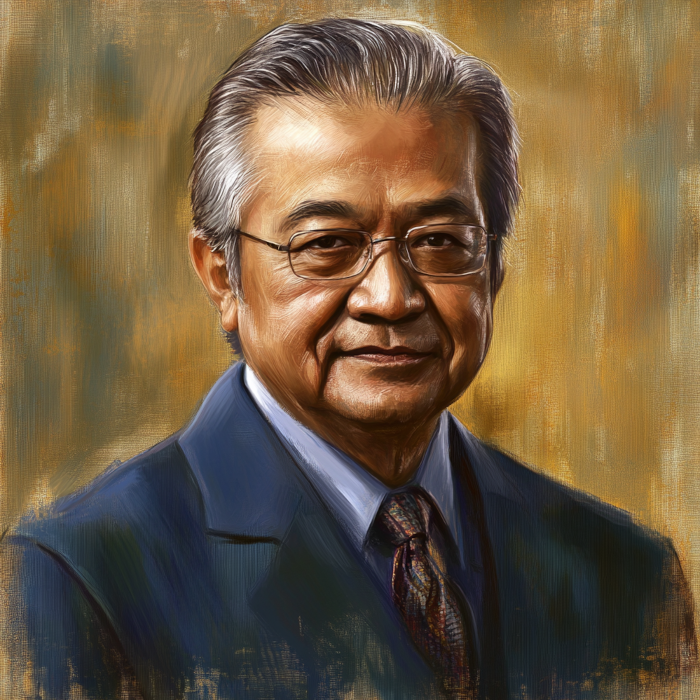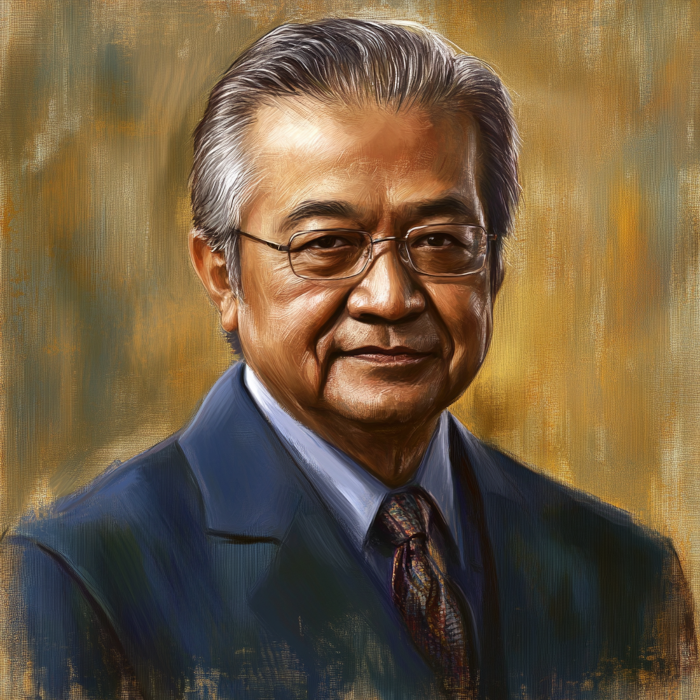


Mahathir Mohamad (born 1925) is a Malaysian politician and statesman who served as Prime Minister of Malaysia twice: first from 1981 to 2003 and again from 2018 to 2020. He is the longest-serving prime minister in Malaysian history, holding office for a total of 24 years. Mahathir is widely credited with transforming Malaysia from a predominantly agricultural nation into a rapidly industrializing country and a key player in Southeast Asia’s economic growth. However, his tenure was also marked by allegations of authoritarianism, restrictions on civil liberties, and suppression of political opposition. His unexpected return to power in 2018, at the age of 92, made him the world's oldest serving prime minister, underscoring his enduring influence in Malaysian politics.
Birth and Family Background: Mahathir bin Mohamad was born on July 10, 1925, in Alor Setar, Kedah, then part of British Malaya, to a modest family. His father, Mohamad bin Iskandar, was a schoolteacher of mixed Malay and Indian descent, and his mother, Wan Tempawan, was Malay. Mahathir’s upbringing instilled in him a strong work ethic, discipline, and a keen interest in education.
Education: Mahathir was an outstanding student and attended Sultan Abdul Hamid College in Alor Setar. He later pursued a degree in medicine at King Edward VII College of Medicine in Singapore (now part of the National University of Singapore). After completing his studies, Mahathir worked as a government doctor, a career that earned him the nickname "Dr. M." His medical background set him apart from other politicians and contributed to his technocratic approach to governance.
Entry into Politics: Mahathir’s political career began in the 1940s when he became involved in the anti-colonial movement and supported the fight for Malay rights and independence from British rule. In 1946, he joined the United Malays National Organisation (UMNO), the dominant political party in Malaysia, which advocated for the protection of Malay interests. Mahathir was an outspoken advocate for Malay nationalism, which would remain a central theme throughout his political life.
Expulsion from UMNO: In the 1960s, Mahathir rose to prominence within UMNO and was elected as a member of parliament. However, following the May 13, 1969 race riots between ethnic Malays and Chinese in Malaysia, Mahathir wrote an open letter criticizing the then-prime minister, Tunku Abdul Rahman, for his perceived failure to protect Malay rights. As a result, Mahathir was expelled from UMNO, and his political career was temporarily derailed. During his time in the political wilderness, Mahathir wrote "The Malay Dilemma" (1970), a controversial book that argued for affirmative action policies to help the Malay majority, which he viewed as economically disadvantaged compared to the Chinese minority.
Return to Politics: Despite the controversy surrounding The Malay Dilemma, Mahathir was reinstated in UMNO in 1972 by Abdul Razak Hussein, the second prime minister of Malaysia. Mahathir quickly rose through the party ranks, becoming Minister of Education and later Deputy Prime Minister under Hussein Onn. When Hussein resigned due to health reasons in 1981, Mahathir was chosen as his successor and became the fourth prime minister of Malaysia.
Economic Transformation and the "Look East" Policy: As prime minister, Mahathir was committed to transforming Malaysia into a modern, industrialized nation. His economic policies focused on rapid industrialization, infrastructure development, and export-oriented growth. One of his signature initiatives was the "Look East" policy, which encouraged Malaysia to adopt the work ethic, technological advances, and industrial practices of Japan and South Korea rather than relying on Western models of development.
Mahathir’s government aggressively promoted foreign investment, developed heavy industries, and fostered the growth of large Malaysian conglomerates, including Petronas, the national oil company. His administration launched massive infrastructure projects, such as the North-South Expressway, Kuala Lumpur International Airport (KLIA), and Putrajaya, Malaysia’s new administrative capital. These projects, along with Mahathir’s support for private sector development, contributed to Malaysia’s rapid economic growth during the 1980s and 1990s, transforming it into one of Asia's "tiger economies."
Privatization and Economic Liberalization: Mahathir’s government also pursued a policy of privatization of state-owned enterprises and promoted private sector involvement in areas such as telecommunications, transportation, and utilities. The goal was to reduce the burden on the state while fostering greater efficiency and economic growth. While privatization helped modernize Malaysia’s economy, it also led to accusations of cronyism and corruption, as many privatization contracts were awarded to business figures closely connected to Mahathir’s political allies.
Vision 2020: In 1991, Mahathir launched Vision 2020, a long-term strategic plan aimed at turning Malaysia into a fully developed, industrialized nation by the year 2020. The vision emphasized economic growth, technological innovation, and the creation of a united, prosperous, and equitable society. Vision 2020 became the defining blueprint for Malaysia’s economic and social development during Mahathir’s tenure.
Authoritarianism and Political Repression: Despite his economic success, Mahathir’s leadership was often criticized for its authoritarian tendencies. He centralized power in the office of the prime minister, curbed the independence of the judiciary, and cracked down on political dissent. In 1987, Mahathir launched Operation Lalang, in which over 100 opposition politicians, activists, and intellectuals were arrested under the Internal Security Act (ISA), a law that allowed for detention without trial. This move was widely seen as a way to stifle dissent and maintain control.
Judiciary Crisis (1988): One of the most controversial aspects of Mahathir’s rule was the judicial crisis of 1988, in which he clashed with the judiciary over constitutional reforms. The conflict led to the removal of several top judges, including the Lord President of the Supreme Court, Salleh Abas. This event severely weakened the independence of Malaysia’s judiciary and solidified Mahathir’s control over the state apparatus.
Asian Financial Crisis (1997–1998): The 1997 Asian Financial Crisis posed a significant challenge to Mahathir’s leadership. Malaysia’s economy was hit hard by the regional currency crisis, leading to a sharp decline in the value of the ringgit and a recession. Mahathir rejected the International Monetary Fund (IMF)'s recommendations of austerity measures and instead implemented unorthodox policies, including capital controls and pegging the ringgit to the U.S. dollar. These measures helped stabilize the economy, but Mahathir’s decision to ignore IMF advice was controversial at the time. Nevertheless, his economic strategy allowed Malaysia to recover more quickly than many of its neighbors.
Anwar Ibrahim Crisis (1998): In 1998, Mahathir’s long-time deputy and potential successor, Anwar Ibrahim, was arrested and dismissed from office on charges of corruption and sodomy. The arrest sparked massive protests and led to the formation of the Reformasi (Reformation) movement, which called for political reforms and an end to Mahathir’s authoritarian rule. Anwar’s trial and imprisonment were widely criticized as politically motivated, and his treatment damaged Mahathir’s reputation both domestically and internationally.
Retirement in 2003: After 22 years in power, Mahathir retired from the prime ministership in 2003 and was succeeded by Abdullah Ahmad Badawi. Mahathir’s retirement did not mark the end of his influence in Malaysian politics. He remained an outspoken critic of his successors and frequently intervened in political debates.
Criticism of Abdullah and Najib: Mahathir became increasingly critical of Abdullah Badawi’s government, accusing him of weak leadership and mismanaging the economy. In 2008, after UMNO’s poor performance in the general elections, Mahathir resigned from the party in protest. He later rejoined UMNO when Najib Razak became prime minister in 2009, but his relationship with Najib soured over time due to allegations of corruption in the 1MDB scandal, which implicated Najib in the embezzlement of billions of dollars.
2018 General Election and Return to Power: In a stunning political comeback, Mahathir emerged from retirement to lead the opposition coalition, Pakatan Harapan (Alliance of Hope), in the 2018 general election. Running against Najib Razak, Mahathir capitalized on widespread anger over corruption and economic mismanagement under Najib’s government. In an extraordinary turn of events, Mahathir’s coalition won the election, and he was sworn in as prime minister on May 10, 2018, at the age of 92, making him the world’s oldest elected leader.
Reforms and Governance Challenges: Mahathir’s second tenure as prime minister was marked by efforts to reform government institutions, address corruption, and strengthen the rule of law. His government reopened investigations into the 1MDB scandal and took steps to recover stolen assets. However, Mahathir’s second term faced challenges, including internal divisions within the ruling coalition and economic difficulties. Despite his reform agenda, Mahathir struggled to meet the high expectations of his supporters.
Resignation in 2020: Mahathir had promised to hand over power to Anwar Ibrahim, his former political rival, after a certain period. However, tensions between Mahathir’s supporters and Anwar’s faction created political instability. In February 2020, Mahathir abruptly resigned as prime minister, citing his inability to resolve the internal conflicts within the ruling coalition. His resignation led to a political crisis, and he was succeeded by Muhyiddin Yassin as prime minister.
Despite these contradictions, Mahathir’s ability to return to power in 2018 demonstrated his enduring influence in Malaysian politics. As both a reformer and a strongman, Mahathir’s legacy will continue to shape Malaysia’s political landscape for years to come. His vision of economic progress and modernization remains central to the country’s development, while his authoritarian methods serve as a reminder of the trade-offs that sometimes accompany rapid transformation.

We use cookies
We use cookies and other tracking technologies to improve your browsing experience on our website, to show you personalized content and targeted ads, to analyze our website traffic, and to understand where our visitors are coming from. Privacy Policy.